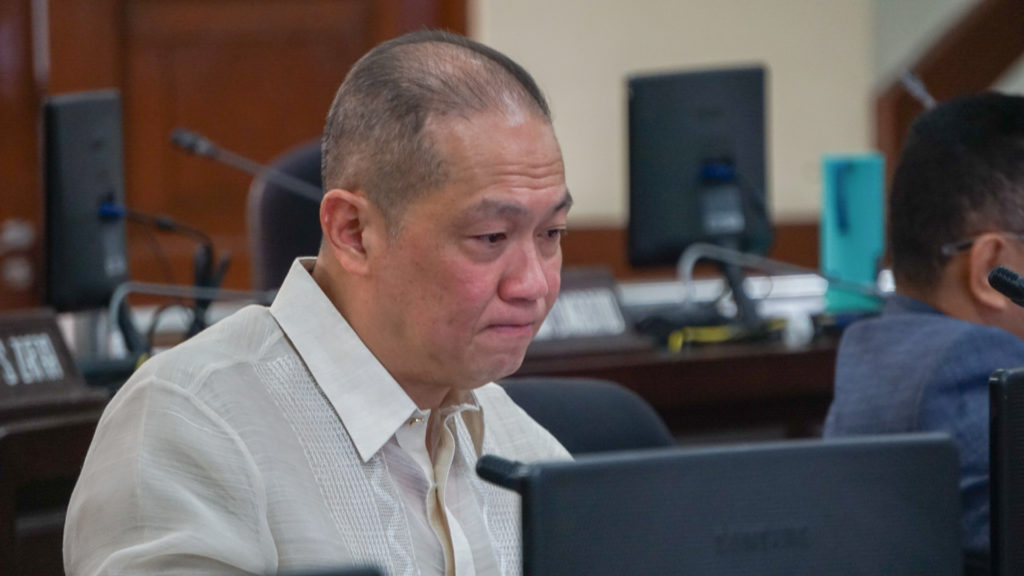
Cebu City Councilor Franklyn Ong, president of the Association of Barangay Councils in Cebu City. | File photo
CEBU CITY, Philippines — Cebu City Councilor Franklyn Ong, the president of the Association of Barangay Councils (ABC) here, expressed his concern on the issues surrounding the distribution of Enhanced Community Quarantine (ECQ) passes that, according to him, have made both the barangays and the city constituents suffer.
Ong, the chief of Barangay Kasambagan, told CDN Digital on Wednesday evening, July 1, 2020, that the barangays (villages) were not consulted on how the new ECQ passes will be distributed nor were they informed of the number of passes that will be allocated per barangay.
The city government said it printed 178,000 QR-coded quarantine passes to be shared by more than 200,000 households–based on the 2015 Philippine Statistics Authority (PSA) census–all over the 80 barangays in the city. But Ong says only 170,000 were distributed.
“Ambot asa nang 8,000 kay sa among count sa ABC, 170,000 raman gyod. Kana palang daan kuwang na kaayo,” said Ong in a phone interview.
(I do not know where the 8,000 is but our count at the ABC is only 170,000. That in itself is not enough)
Read: New QR passes for Cebu City to be distributed starting tomorrow
The barangay has repeatedly appealed to the city government for additional passes but this has fallen on deaf ears.
The insufficiency of the passes has placed the barangays in a bad light since many residents believe village officials are keeping the passes for their own use.
Ong clarified that there are simply not enough passes. This is the reason why barangays are forced to find ways to share the QR passes among compounds, sitios (sub villages), and neighborhoods.
Read: QR passes for residential complexes can be shared, says Cebu City ABC prexy
This issue has garnered many complaints from the residents who have been promised a one-pass-one-household policy by the city government.
Fake passes?
The problems with the new passes do not end with its distribution.
Ong said the lack of coordination between the police and the city government has also brought additional burden to the barangays as police officers at checkpoints refuse entry to shared QR code pass holders.
Reports of police confiscating QR code passes issued by the barangays have been rampant as well with the residents complaining that there is no clear guide to distinguish a real QR code pass from a fake one.
Arnel Samson, a resident of Barangay Kalunasan, got his pass confiscated by the police at a Barangay Capitol Site checkpoint on July 1, 2020, all because the police though his pass was fake.
Samson told CDN Digital that his pass was issued by the barangay on June 28, 2020, and it was his first time using the pass.
“Giunsa pagka fake ani nga gikan man ni sa barangay? Unsa diay ila basehan?” asked Samson.
(How can this be fake if this is from the barangay? What is their basis?)
Police Colonel Cydric Earl Tamayo, Cebu City Police officer-in-charge, did not provide a clear answer when asked by CDN Digital through a text message on how to differentiate a fake pass versus a real one. But he said the city government has provided guidelines on how to check these.
He said that they confiscated photocopied ECQ passes as well as those suspicious ones.
“There are significant features that we can identify if the pass is fake. It was consulted directly from city hall on how to identify the fake,” said Tamayo.
If the pass is suspicious, the police will ask the issuing barangay for confirmation if the pass was indeed released by them.
Inayawan Barangay Captain Kirk Bryan Repollo said they only followed the strict instruction of the city on how to set up the pass, even if there is no uniform instruction where to place the QR code sticker or how to distribute them.
“Wala mi gibutang nga significant marka kay nilikay mi basin maconsidered unya as tampering. We just had the Qpasses as it is and as per instruction [from the] Cebu City government because we did not anticipate these kinds of problem [because] all city Q passes we issued were from city hall. That is why we were also surprised that these problems arose. We just explained to Pardo Police Station and showed them the 2 kinds of stickers of the QR Codes,” said Repollo in a text message
(We didn’t put any significant marks because we were trying to avoid being accused of tampering.)
For Ong, these small issues should not have been placed on the shoulders of the barangays officials, who have been working tirelessly since the start of the coronavirus disease 2019 (COVID-19) pandemic months ago.
He said that many barangay workers have fallen ill during the pandemic whether by COVID-19 or not, such in the case of Pardo Barangay Captain Manolita “Litang” Abarquez, who died due to a respiratory illness.
Read: Pardo barangay captain passes away
“Wala miy kalibutan unsa ilang plano. Wala miy labot sa pagplano. Pero kami motrabaho tanan, nya kami pay sad-an pirmi,” said Ong.
(We have no idea what the plan is. We are not part of the planning. The barangays work hard for everything, yet we are always at fault)
Ong is urging the city government to coordinate better with the barangays and “genuinely” provide assistance.
The situation for barangay chiefs and the workers have been growing worse as more personnel get infected with the COVID-19, and he said the least the city government can do is be more sincere in its dealings with the barangays.
“Please give justice to the death of our barangay people, give justice to the death of Kap Litang,” said Ong. /bmjo

